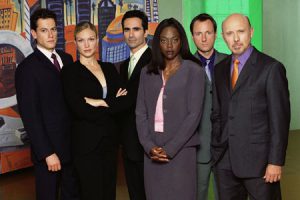“Century City” (2004, CBS) was quietly – too quietly, as it turned out – one of the most innovative law dramas from the era when “Law & Order” and “The Practice” dominated the ratings. Because it’s set in 2030 and therefore deals with the legal issues that are right around the historical corner, it forces thoughtful writing. No clichés allowed.
Before getting into the predictive nature of the show, let’s first note that the foundation is firmly in place: The lawyers are played by a stellar cast including Viola Davis (“How to Get Away With Murder”), Nestor Carbonell (“Bates Motel”), Ioan Gruffudd (“Ringer”), Kristin Lehman (“Drive”), Hector Elizondo and Kevin Spacey sound-alike Eric Schaeffer.
Pre-trial hologram communications and virtual assistants place the show in the future, but the courtrooms and procedures are familiar. (But oddly, the chairs in the courtroom look less comfortable in the future.)

“Century City” (2004)
CBS, 9 episodes
Creator: Ed Zuckerman
Stars: Nestor Carbonell, Viola Davis, Ioan Gruffudd
Each episode is structured like “The Practice”: One serious case and one less-serious case. The serious cases tend to operate in the real world of law, citing the Constitution and Supreme Court rulings. The less-serious case is a personal argument played out in a trial format.
Too often, family members take each other to court rather than just talking things out. I doubt this will become a thing in the future – not because people aren’t prone to litigation, but because it’s just becoming too darn expensive.
‘Century City’s’ predictions
Because “Century City’s” nine episodes (four aired, five unaired in the CBS run) were never released on DVD or via streaming, no one talks about it. But since we’re halfway to 2030, it seems like a good time to look at the show’s predictions. It’s always risky to predict the future, but so far, “Century City” doesn’t look too ridiculous.
First, some fun ones that seem either logical enough or crazy enough to be true in 13 years:
- Cherries without pits are available.
- Mick Jagger is still playing live concerts, with help from anti-aging science.
- Cats and dogs aren’t legal property.
- A “smart freeway” takes control of vehicles during congestion.
- Alzheimer’s has been wiped out.
- Smart-fridges order milk when you run out.
- Smart-guns have a DNA lock.
- People favor patches instead of pills to adjust their emotional state.
- Oprah Winfrey is the president.
- Microsoft has two colonies on Mars.
And some slight misfires (at least, so far):
- People go into bookstores to download books. I can’t imagine how stores could turn the tables and compete with the convenience of computers.
- While the “smart freeways” seem on-point, the show suggests people still manually drive cars when roads aren’t congested. It’s likely that driverless cars will be the norm in 13 years.
- Fast aboveground trains are common in L.A., and fairly popular. This suggests a sea change in Californians’ travel habits compared to the past 13 years.
- People use cheap and disposable cam-cards to shoot video. Cool enough, but why would this be better than a smartphone that can do everything?
- “Net” has overtaken “web” as the preferred term.
- “PDA” has overtaken “smartphone” as the preferred term.
- And here’s one that’s already wrong: The last biological weapons attack, in the future of “Century City,” was in 2009. (The show is particularly interested in anthrax, to which genetically engineered folks like LeeMay are immune.) Woopsie – a notable bio-attack happened this year in Syria.
Entrenched spy state
Digging a little deeper, the theme that feels most timely in 2017 is domestic spying. In “Without a Tracer” (episode 6; I’ll be referring to the chronological order, not the airing order), teenager Erin (“Parenthood’s” Mae Whitman) is suicidal, so her parents use the implanted ChildSafe chip to track her, and they use the associated ChildWatch program – where surveillance cameras film her via the chip – to make sure she’s safe.

However, Erin claims that being watched all the time is why she’s suicidal. The lawyers cite Brandeis’ “right to be left alone” ruling from 1890 as “Century City” tentatively taps into the notion that the next generation will be the first to not know what privacy is.
It’s weird that surveillance cameras are ubiquitous on the show – in “The Haunting” (7), a hacker compiles thorough footage from a man’s life using said cameras – yet “Century City” doesn’t exactly predict government spying. Indeed, when Tom (Carbonell) says constant surveillance is un-American, he pauses for dramatic effect, not for laughter.
Granted, the first post-9/11 whistleblowers came forth in 2005, and the much-more-hyped Snowden revelations hit in 2013. But it’s odd that “Century City” seemed to think corporate spyware – most of it via hackable cameras — would be more prevalent than metadata collection by the feds.
Grappling with genetic engineering
Genetic engineering is “Century City’s” most ubiquitous futuristic theme. LeeMay (Lehman) was grown as part of the Genetic Prototype Project. In “Only You” (9), a murder suspect (“Once and Again’s” Billy Campbell) was born via in-vitro fertilization (which of course is nothing new, but it’s definitely old hat by 2030), and the plot thickens when we learn he has a twin who is six years younger.
The gay-rights movement has enjoyed a remarkable rise in the time since “Century City” aired, but “Sweet Child of Mine” (4) intriguingly argues that the gay population will face a crisis in 2030. This isn’t because the show failed to see equal rights coming around the corner, but because it knows designer babies are also around the corner.
When parents can custom-build their child, they tend to not choose one where there’s a check mark next to the box for the gay gene. This comes partly from mild homophobia and partly because they don’t want an additional challenge for their child. As such, the gay population decreases; indeed, the population becomes more homogenous in all ways.
That’s a sad thought, but I wouldn’t fret too much about it, as I’d guess a reactionary push away from homogeny would be the societal response. “Century City,” on the other hand, celebrates a (somewhat questionable) legal victory for a geneticist who purposefully neglects to check the gay box.
In the pilot episode, which predated “The Island” (2005), a boy is going to die unless he receives part of a liver from his cloned embryo. As is often the case on “Century City,” the defendant – the government — has no good reason to prevent this life-saving option except that the idea of this cutting-edge science makes us all a bit squeamish.
Pollyanna outcomes
The good guys almost always win on “Century City,” making for an odd mix of sober-minded predictions and hopefulness. It imagines there’s universal health care via the National Health Service, but the quality of service is essentially what V.A. patients currently experience.
On the other hand, it leans toward Pollyanna outcomes and features cases where judges and juries choose what’s morally right; they may find case law that fits, but a viewer does get the sense that it’s a bit convenient.
The episode I most remembered among the four that aired is “Love & Games” (3), which deals with health advances. Generally, “Century City” is cautious in this category: In other episodes, we learn that cures for mental retardation and spinal injuries had hopeful advances, only to be followed by frustrating setbacks.
Changes to national pastime
In “Love & Games,” “Home Improvement’s” Zachery Ty Bryan plays a baseball player named Teddy who had surgery to save his eye. Although his vision is restored at the same level – he didn’t want an unfair advantage – he has a slightly faster reaction time because his vision is more directly hooked to his brain.
The legal conundrum is similar to the 2001 case of Casey Martin, a professional golfer with a leg defect: If he doesn’t use a golf car, he can’t play, but if he does use a golf car, he has an advantage.
“Love & Games” has already whiffed on one baseball change. During spring training, when he’s ostracized for his enhanced eye, another player injures Teddy with a takeout slide. In the real world, that slide was outlawed in 2016, after a 2015 playoff incident.
The episode predicts the mound will be moved back to 62 feet in the next few years, and by 2030 there will be expansion teams in San Fernando Valley, San Antonio and Havana. (The future of Cuba is always a tantalizing thing to predict. If Communism is overthrown, it’ll be fascinating to watch the U.S.’s neighbor become westernized overnight. Yet it’s impossible to say when that revolution will occur.)
One crazy idea
As with most quickly canceled shows, there’s not much literature about the making of “Century City.” But I imagine creator Ed Zuckerman and his writing team decided that when guessing about the future, you should try one completely crazy idea.
That’s found in “A Mind is a Terrible Thing to Lose” (8), when a man sues a woman for not disclosing that she has a penis (yep, “Century City” beat “Always Sunny” to the punch on this joke). The woman is not a transsexual; rather, the show posits that penises will be popular cosmetic add-ons for women – and men who choose to add a second one.
A commercial suggests that having the penis allows women to feel confident when they go out into the world, knowing that they are “packing.” Such a sentiment seems unlikely to take off, and if one were to take this episode as a serious piece of gender-roles analysis, it would be problematic. Whether this is “one crazy idea” or a byproduct of the David E. Kelley era, it’s certainly a memorable arc.
And “Century City” should’ve been a well-remembered series rather than being lost in the dusty shelves of TV history. While imperfect, it’s a rare show in the law genre that one can honestly say is “different.” It’ll be fun to watch it again when the real 2030 rolls around — and very possibly, when Oprah really is the president.

This blog post is part of a series about great short-lived TV shows that haven’t been released on DVD or digital or streaming services, and are rarely – if ever — shown in syndication. While some of these shows can be found somewhere on the Internet, fans of great TV want to see them get a proper release. If you’re one of those fans, your best bets are to vote for the show at TVonDVD.com or to request information from Amazon.com in the event the show gets released. This will let the copyright holder know of your interest.
Main image: CBS publicity photo

